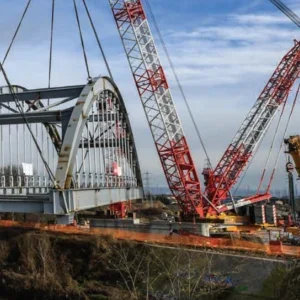It has been 21 years since Coles Crane became subsumed in the Grove empire and more than seven years since its last plant, in Sunderland, closed. But the UK manufacturer is still remembered fondly by many former employees, who still gather together from time to time under the auspices of Cobblers – Coles Old Boys Been Left and Early Retired Society.
Many Cobblers will be delighted to hear that one of their alumni, Dick Lloyd, has finally published the memoirs that he has been threatening for several years.
Like most careers, Lloyd’s is characterised by a healthy mix of mini-triumphs and mini-disasters, but there are one or two lessons to be learned – not least since the course of his career followed the decline and fall of British manufacturing.
Lloyd’s self-published account of his career, 40 Years a Salesman*, offers an individualistic perspective of the industry’s history, laced with assorted eccentrics, alcoholics and charlatans.
Lloyd joined Coles in 1957 as a graduate trainee, moving to the export department a year later. He soon witnessed the coming together under the Steel Group of Coles, RH Neal and F Taylor & Sons to create the British Crane Company (later British Crane & Excavator Corporation). He learned that his early indoctrination on the merits of Coles’ technology over all competitors was “a long way from fact”. The Neal cranes were robust duty-cycle machines but each model was designed by a different draughtsman and so there was no commonality of parts. Lloyd recalls: “Instead of harmonizing the design of all models using well-tried Neal technology, Coles’ arrogant production-orientated solution to this was to scrap the whole Neal range and substitute it with a Coles mechanical system, utilizing Coles reduction gearboxes and Coles electro-mechanical brakes operated by air. The result was nothing less than a technological disaster. The ‘fail-safe’ air-mechanical brakes sold to a Danish port failed to danger instead and the grab went straight through the bottom of the boat’s hull.”
Frustrated by poor relations with his boss Dennis Mattingley, Lloyd left Coles in 1965 for the export department of excavator manufacturer Hymac. After five “colourful” years there (few Lloyd years are without colour) he returned to the Steel Group as export manager for the recently acquired Priestman excavator business. Soon after, Steel was taken over by Bill de Vigier’s Acrow.
Such corporate developments, however, are merely the backdrop to Lloyd’s purpose of stringing together anecdotes. Dick Lloyd was not what you would call a corporate man. He was too busy out on the road having adventures, at trade fairs in Romania or Poland.
For most of his career Lloyd specialised in Eastern Europe and his tours behind the Iron Curtain must have been something to behold. A beaten up old car loaded with provisions, including bottles of Scotch to be left strategically on the desks of key purchasing decision makers. He also always travelled with a camping gas stove, kettle and tea-bags. Daily at 4pm he would pull onto the side of the road, ignite the stove and brew up a pot of tea.
Lloyd’s account is light on analysis of the failings of the British manufacturers but one or two insights are offered. For example, while Coles’ output hit peaks of 1,000 cranes a year with 3,000 employees, Grove was using outsourcing to produce 1,500 a year with just 800 employees. It was Grove, in 1984, that took over Coles when Acrow collapsed. When Priestman was acquired by rough terrain forklift truck manufacturer Sanderson a year later, Lloyd’s services were no longer required.
Lloyd began a new phase of his career, setting up Grabcranex with a couple of Polish friends to sell equipment into Poland for the likes of Sennebogen and, for a while, what was by then Grove-Coles.
As an independent, Lloyd was at last free to exercise his free spirit. “One of the things at which I excelled was upsetting the hierarchy in Grove which, I must admit, I rather enjoyed doing. As an independent one could get away with saying and doing things which no employee would dare do.” Never shy of sailing close to the wind, Lloyd admits to making short cuts to secure sales. He recounts how a Polish customer required a crane for work in Finland. A week before it was due to enter operation the Finnish inspector announced he required an official statement in writing from the manufacturer of the exact weight reduction when the lattice swingaway boom extension was removed. Lloyd sought this information from Grove only to be told it would take weeks to find out. Faced with the prospect of paying a penalty for the delay, Lloyd took it upon himself to type a letter on Grove headed paper with plausible-sounding information, signed it and handed it to the inspector. All hell broke loose at Grove, but Lloyd ignored it and rode the storm. He’d had plenty of practice at riding storms by then.
*Available from Maygreen Publications, 2 Brook Cottages, Sherford, Kingsbridge, Devon TQ7 2AX. Tel: +44 (0) 1548 531068. Fax: +44 (0) 1548 531951. Price £26, including postage and packaging (£25 UK). Cheques should be made payable to RJ Lloyd.






